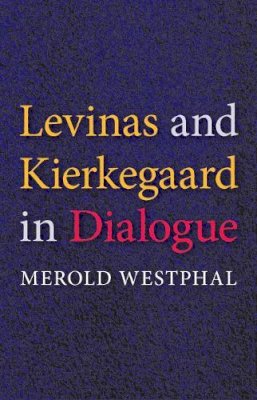
Stock image for illustration purposes only - book cover, edition or condition may vary.
Levinas and Kierkegaard in Dialogue
Merold Westphal
€ 30.74
FREE Delivery in Ireland
Description for Levinas and Kierkegaard in Dialogue
Paperback. A comparative study of the thought of Levinas and Kierkegaard Series: Indiana Series in the Philosophy of Religion. Num Pages: 208 pages, black & white illustrations. BIC Classification: HRAB. Category: (P) Professional & Vocational. Dimension: 5969 x 3963 x 10. Weight in Grams: 294.
Few philosophers have devoted more than passing attention to similarities between the thought of Søren Kierkegaard, a Danish Christian, and Emmanuel Levinas, a French Jew. Here, one of philosophy of religion's most distinctive voices offers a sustained comparison. Focusing on questions surrounding otherness, transcendence, postmodernity, and the nature of religious thought, Merold Westphal draws readers into a dialogue between the two thinkers. Westphal's masterful command of both philosophies shows that each can learn from the other. Levinas and Kierkegaard in Dialogue is an insightful and accessible contribution to philosophical considerations of ethics and religion.
Product Details
Format
Paperback
Publication date
2008
Publisher
Indiana University Press United States
Number of pages
208
Condition
New
Series
Indiana Series in the Philosophy of Religion
Number of Pages
208
Place of Publication
Bloomington, IN, United States
ISBN
9780253219664
SKU
V9780253219664
Shipping Time
Usually ships in 7 to 11 working days
Ref
99-50
About Merold Westphal
Merold Westphal is Distinguished Professor of Philosophy at Fordham University. His most recent works include Transcendence and Self-Transcendence (IUP, 2004).
Reviews for Levinas and Kierkegaard in Dialogue
"Westphal (Fordham Univ.) has written the first book-length comparative study of Kierkegaard and Levinas, and for that reason alone it is worth reading for students and scholars of either major figure. The chapters are reworked articles and book chapters dating back to the early 1990s, so readers will discern that Westphal has been thinking about these figures for some time. The book comprises four units: "Revelation,"God,"Heteronomy," and "Reversal." Each unit consists of two chapters, and the layout is almost chronological in terms of their previous publication. This organization allows one to witness Westphal's thinking mature and develop, chapter by chapter. Although this volume is not the final word on Kierkegaard and Levinas studies, it aptly sets the stage for a continuing conversation about existential philosophy, phenomenology, the status of ethics, the place of religion in the present age, and sociopolitical theory, which has gone through the "postsecular" turn. Westphal's previous work is clearly focused on Kierkegaard and post/modern Christian philosophy, but the author is interested in and conversant with Levinas's Judaic tradition. Summing Up: Recommended. Upper-level undergraduates through faculty/researchers. — Choice"—M. R. Michau, Penn State University, December 2008 "[Westphal] has provided us with an important study, not only in terms of the ways it illuminates these two particular thinkers, but also in its careful comparative methodology that provides a useful model for further philosophical dialogue between past and present representatives of Jewish and Christian religious thought.26.3 July, 2010"—Daniel H. Weiss, University of Cambridge "Westphal's book will set the terms for future debates about what at times seem like the indiscernible differences that make these two thinkers both very near and very far from each other. —Jeffrey Kosky, Washington and Lee UniversityThis is an important and engaging work that will help readers to understand better not only Levinas and Kierkegaard, but also the nature of otherness and transcendence."—Brian Treanor, Loyola Marymount University "This is an important and engaging work that will help readers to understand better not only Levinas and Kierkegaard, but also the nature of otherness and transcendence."—Brian Treanor, Loyola Marymount University
